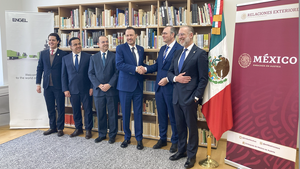New PS foam label technology designed to keep beverages colder
With the weather starting to warm up, many are reaching for a cold brew. After all, drinking beer is a favorite pastime for many. But there's no denying that when these beverages warm quickly it significantly impacts the taste.Polystyrene foam manufacturer Commodore Plastics believes its new Labec foam label can help with this beer dilemma.
March 29, 2013
With the weather starting to warm up, many are reaching for a cold brew. After all, drinking beer is a favorite pastime for many. But there's no denying that when these beverages warm quickly it significantly impacts the taste.
Polystyrene foam manufacturer Commodore Plastics believes its new Labec foam label can help with this beer dilemma.
Commodore developed a technique for coextruding polystyrene (PS) foam shrink-label stock that insulates aluminum, glass and polyethylene terephthalate (PET) beverage containers that help keep liquids colder for longer. Commodore tests have demonstrated that Labec foam PS labels keep beverages colder an average of 15 to 20 minutes more than plain cans, based on a beverage-temperature gain without the label of 20-30ºF over the course of one hour.
 Gary Duncan, a contract consultant to Commodore, told PlasticsToday the foam label technology is addressing a need.
Gary Duncan, a contract consultant to Commodore, told PlasticsToday the foam label technology is addressing a need.
"Basically, it provides a good insulation," he said. "It's especially effective in the summertime dealing with fairly warm conditions. This will help keep the beer cold. No one wants to sit on a golf cart with a beer that gets warm on them."
The insulating properties of Labec foam mean the beverage may be enjoyed straight from the can without any of the extra moisture and condensation inherent in aluminum cans as they warm toward room temperature. The Labec PS foam labels may be printed, hot-stamped for a premium look, metallized and embossed, among other options, the company said.
Brad Braddon, president of Commodore Plastics, said that the labels can improve the recyclability of containers if left on aluminum cans or ground up with glass bottles. The fuel value of the label replaces 5-8% of the natural gas used in recycling, he said.
While initially they are targeting small and large breweries, Duncan said they also see potential for the technology to be used on a broader basis in the general beverage arena such as juices and energy drinks.
"The thing I most like about it is that you get a lot of thickness with less material because it is foam and very light," he said. "It can be used for many things. On glass, for example, the material gives you a softness, a better feel and handle and it reduces condensation so there is less of a chance of dropping and breaking it."
Material for sampling is available right now. Commodore Plastics is currently showcasing its innovation at the Craft Brewers Conference and BrewExpo America (March 26-29; Washington, DC).
About the Author(s)
You May Also Like


